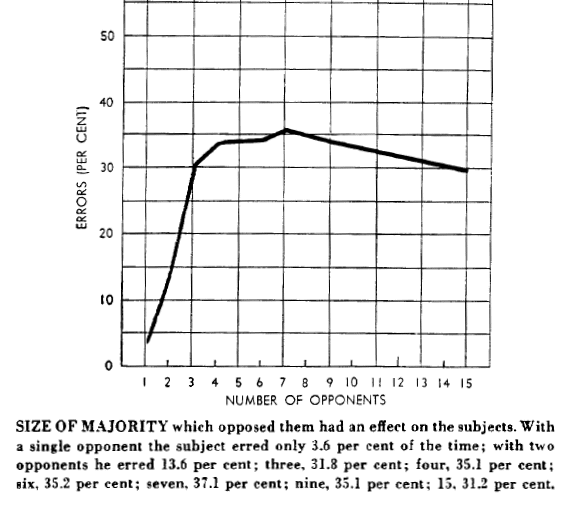The Conformity Cascade
Crowd Mentality has been a big topic in the area of psychology. People in masses tend to act differently than individuals. What is the reason behind this? Do people actually lose their personalities when surrounded by other people? Do they just blindly follow others? Are they too afraid to express what they really think? Or are they actually making the best informed decision that they can?
It just so happens that crowd behavior can easily be modeled as a specific case of the accept & reject cascade. People look at the decisions that other people around them make, and based on that they make their own decision. If everyone else is making the same decision, then why even consider your own opinion, might as well just go with the flow.
Solomon Asch did a number of tests about conformity in 1958. His experiment consisted of the following:
Every participant would be placed in a group with a number of ‘confederates’ (people who knew the true aim of the experiment but were introduced as ‘other participants’ to the participant). They were told that they were participating in a number of visual tests, very simple tests (like saying whether two lines had the same length) with obvious answers and they were asked to say their answer out loud (so other participants could hear). For the first 2 trials, the confederates would give the correct answer, making the participant at ease as everyone agreed. On the following tests, the confederates would all give the incorrect answer before giving the participant a chance to say his answer. These trials were repeated a number of times to see how much an individual would conform (the confederates would all occasionally give the correct answer again to make the experiment more believable).

What line from the right card has the same length as the one from the left card?
Given how obvious the tests were, Asch predicted that everyone would just follow their own instinct, but he was surprised when 75% of people conformed at least once and 5% conformed every single time. This is a clear example of the cascade effect, if all the people agree on a certain decision, then everyone following them will also agree on the decision. Furthermore, let’s look more closely at the results:

We can see that from 3 confederates onwards, the error percent is almost constant. This is just as the cascade effect we saw in class, where if the first two participants agreed, then everyone following would discard their opinion and follow the first two.
What is interesting to see is that 3 confederates were required as opposed to the 2 that we would have expected following what we learned from class. I believe that what is happening here is slightly different to what we saw in class. In class, every person received one signal and they were able to see the decisions made by everyone before them. I believe that here, every person has at least 2 signals and they are still able to see the decisions made by everyone before them. So every person tends to believe in their own knowledge more than a random person’s knowledge, but only up to a certain point.
Now the question is, what makes you have a higher number of signals? Is it knowledge or perhaps self-confidence? Maybe is just sign of how stubborn you are. The important thing to gather from here is that sometimes (maybe even most times) it is important to stand by your own beliefs, even if the whole world is against you. Cascades can easily be wrong.
http://www.age-of-the-sage.org/psychology/social/asch_conformity.html
